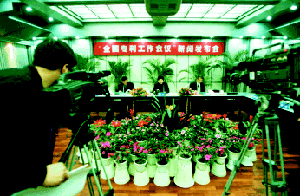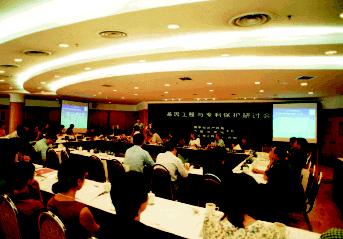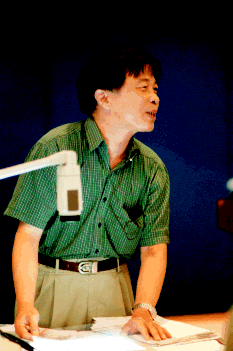VIII. Publicity, Training and Academic Activities
1. Publicity
In 2000, guided by the theme of "Development Is the Truth" and around such central tasks by the Central Committee as improvement on the socialist market economic system through the strategic adjustment of the economic structure, implementation of the "going-out" policy by means of "introducing-in", and preparation for "WTO entrance", the Office conducted publicity on the intellectual property in width and depth, moving up to a new stage on publicity.
First, by means of the organization of the "Exhibition on China's 15-Year Achievements in Patent Work" and the publicity by central news media including the commentator article of "New Starting Point, Great Development" in the "People's Daily", emphasis was made to demonstrate the care and support to the patent by the Party and State leaders and President Jiang Zemin.
Second, a press conference was co-organized with the Information Office of the State Council, for purpose of exposing to the world the significance of the second revision of the Patent Law. Also article of "Promotion on Technical Innovation Is the Key Issue" was written in "People's Daily" for more publicity.
Third, after the National Conference on Patent Work, the Office worked with other departments and local governments to organize various forums, exhibitions, fairs, workshops, seminars focusing on technical innovation brought by the patent system, and the Office also held some activities to fight against passing off patents and illegal use of the UL Certification marks. This demonstrated the important role the Office played in the administration of the national patent work, promotion of the development of patent, the restructuring of the national technologies, industry and regional economy, the industrialization of new and high-tech focusing on the patent, and standardization of the technical market in China.
Fourth, the Office and international intellectual property or patent organizations and departments concerned under the Central Committee organized various meetings and activities in undertaking its role of comprehensively coordinating the foreign-related intellectual property issues.
Fifth, the Office held the press conference of "Patent Applications Exceeding 1 Million" at the beginning of 2000, which fully reflected the development of the patent system in China and the sacred obligations of the Office in receiving, examining and granting patent.
Sixth, the Office issued such documents as "Opinion on Strengthening Local Publicity" at the beginning of 2000, so as to guide the local patent authorities in patent publicity with determination by referring to different situations and focusing on the awareness of the public in the intellectual property, thus creating favorable force for the nationwide patent publicity.
Seventh, in order to encourage journalists and people in the IPR circle to publicize the intellectual property and improve the awareness for IPR, the Office held the Fifth National Contest on Excellent Patent News and issued the "Notice on the Result of the Fifth National Contest on Excellent Patent News" at the beginning of 2000.
Eighth, the launched activities for patent publicity in cooperation with CCTV includes:
-- "Innovation Star" TV contest to foster the technical innovation ability and awareness for IPR protection among the youth;
-- Special TV program of "Patent in the Development of Western China" to demonstrate the important role of patent in the Development of Western China;
-- "Public Advertisement for IPR Protection "to improve the public awareness of the IPR protection;
-- April 26, 2001 -celebration party for "World Intellectual Property Day".
Ninth, the Office continued to pay attention to means of Internet for On January 17, the office held a press conference on the National Conference on Patent Work publicity. The web site of State Intellectual Property Office was updated on January 1,2000, which will present comprehensive introduction of the Office (web site: www.sipo.gov.cn).
Tenth, the Office continued to act in the spirit of "Enhance Management, Optimize Structure, Increase Quality" and gave full play to its advantage in the distribution of the professional papers under its supervision. After 20 years, the Intellectual Property Publishing House strengthened its functions, increase the IPR related publications including the patent and improve the quality of the publications.
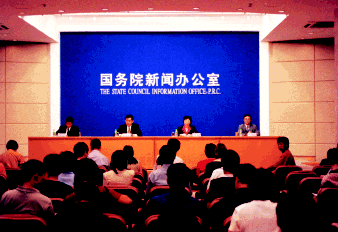
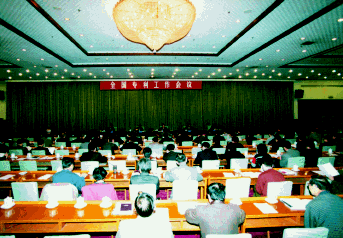
The left picture: On September 10 the Information Office of the State Council was holding the press conference with SIPO on the second revision of the Chinese Patent Law.
The right picture: Scene of the National Conference on Patent Work.
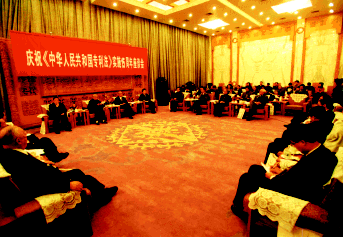
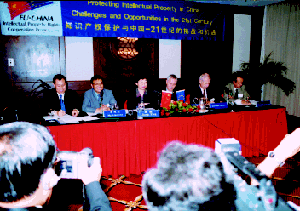
The left picture: On 6th April, the SIPO convened in the People's Great Hall the Celebration Meeting for Commemorating the 15th Anniversary of Implementation of the Chinese Patent Law.
The right picture: On July 24, the SIPO co-organized with EU and the European Patent Office the International Symposium on Intellectual Property Protection in China-Challenges and Opportunities in the 21st Century. The picture shows the scene of the press conference.
On January 17, the office held a press conference on the National Conference on Patent Work.
2.Training
(1) Social training
The Office enhanced the training with view to extending the social influence by IPR and improving the qualification of IPR personnel. In 2000, the Office for the first time provided a series of training to entrepreneurs, and by working together with the State Commission for Economic and Trade, leaders from 520 enterprises received IPR training, which were well welcomed. Due to the fact that the IPR work was conditioned upon an efficient patent work team, the Office provided corresponding training to the leaders of local IPR administrative authorities and leaders at Director and Director-General levels of the Office. In order to update the agents knowledge, more than 1000 agents attended the training. Moreover, the Office also gave guidance and support to the training by local IPR administrative authorities. Required by the Office, those local administrative authorities provided training to administrative leaders above the county level and managers of local enterprises. More than 20,000 administrative leaders and over 100,000 enterprise managers attended the training. Such training was welcomed by all sides and produced excellent social effect. Correspondingly, the IPR work was emphasized and strengthened.
(2) In-house training
At the beginning of 2000, the Office provided two one-week sessions of training on related laws to the new examiners. The related laws included: the Trademark Law, the Copyright Law, the Administrative Reconsideration Law and the Civil Law. Through legal training, the new examiners, who possessed excellent technical background but deficient knowledge on laws, enlarged their knowledge, enhanced their legal quality and increased their awareness of conformity to law.
In order to meet the needs of accelerating examination, the Office organized language trainings for examiners including 5 classes for Japanese language and 2 for English language from April to December. It efficiently improved the search speed and quality by use of foreign languages, and the language level was elevated.
In order to meet the needs of the development of the modern information technology, the Office organized more than 20 sessions of computer and Internet training courses from April to late June, and staff from the automation department was invited as instructors. The purpose was to train every one in the Office to make full use of the automation system so as to increase the office automation level.
To provide further education for the employees and update their professional knowledge, the Office encouraged each department to invite expert in the corresponding field for speech and also provided the funding support. In addition, the Office enhanced the administration and approval of examiners field research and social practice. Examiners were required to prepare research scheme in advance and make summaries upon return. Such social practice not only helped the examiners gain more face-to-face knowledge of the latest development in the corresponding technical field, but it also bridged the gap between examiners and inventers-appticants for both the efficiency and understanding of the Patent Law.
In order to help local authorities and enterprises to popularize the patent knowledge, increase the awareness for patent protection and publicize the newly revised Patent Law, the Office made recommendations for lectures to lecture outside the Office.
In order to set up the procedure to include patent protection into the process of technical innovation, formulate the macro patent policy, especially to provide reference to the IPR upon the entrance into WTO, the Office, funded by Foreign Experts Bureau, organized a 24-day "US Patent Policy and Patent Strategy" training course in US, which proved to be very successful. Trainees included 20 leaders and key members from the patent administrative authorities, enterprises and courts in provinces and cities.
(3) Training in Examination
In 2000,the Office had recruited 56 new examiners. In order to get them accustomed to patent examination in their respective field within a short time, the Office, on the basis of the advanced experience of other countries, further strengthened the training in patent examination. After 4 months lessons on patent basics, the new examiners were able to perform their work under the guidance of instructors. Moreover, they held regular meetings to communicate their experience in examination, so as to settle the problems occurred at work and enrich their experience and improve the examination level.
In 2000, the Office further strengthened the periodical review on the examination by new examiners. Thus the training was put on the trail of scientific management starting from their first day in the Office.
In 2000, the Office organized 10 internal seminars on patent examination, the content of which included examiners 'training; communication of special topics on examination practice; education on related laws and regulations; revision of the examination guidance; administrative reconsideration, etc. Over 800 people participated in the seminars through the whole year.
(4) Professional training to patent agents
In order to increase the professional level of patent agents, the Office worked out the "Measures for the Professional Training of Patent Agents". In 2000 when it was implemented, the Office organized 9 sessions of training courses, in which over 1,000 patent agents from nationwide patent agencies participated. This was the first systematic training the Office provided to patent agents and received very good results.
(5) Training at China Intellectual Property Training Center in 2000
Year 2000 was the first year in which SIPO assigned concrete tasks to the China Intellectual Property Training Center (CIPTC) and the first year in which CIPTC realized standardization in performance.
The training at CIPTC in 2000 had two outstanding features: one, the regular training system, which began to take shape; the other, the focus on the training of enterprises and Western China, following the State policy and the circumstance for WTO entrance.
The Office held nearly 30 sessions of various training courses, as well as two World Intellectual Property Organization (WIPO) Asian Seminars and one Mainland and Hong Kong IPR Seminar, with over 2,000 participants. The training included IPR basics, examination and approval for patent for inventions related to computer programs, examination and approval for patent for inventions related to medical apparatus, examination and approval for patent for inventions related to biological technology, patent examination, patent agency, revision of the Patent Law and IPR litigation. The participants included patent examiners, patent agents, staff from IPR administrative authorities, enterprise managers, IPR personnel from scientific research institutions and civil servants.
To follow the State policy of Western Developmente, CIPTC successfully organized a session of IPR training course in Tibet, the first training activity by SIPO in Tibet. More than 100 people participated in the course including leaders of the Tibet autonomous region government, departments, bureaus, commissions and offices, heads of various scientific institutions, enterprise managers and leaders of scientific commissions at the city level.
The graduate education program jointly sponsored by CIPTC and the Central China Scientific and Technical University was on the smooth run.
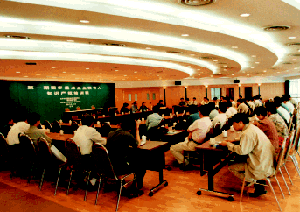
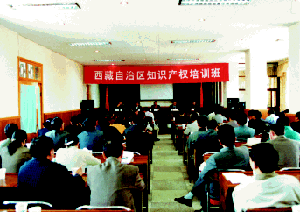
The left picture: SIPO organized jointly with the State Commission for Economy and Trade, the first Training Seminar on Intellectual Property for Leaders of State.
The right picture: On August 8, the SIPO held in Lasa city the first intellectual property training seminar for Tibet autonomous region.
The first phase of the CIPTC automation project was basically completed. The library obtained nearly 1,000 new books and received books as gift from WIPO, European Patent Office and Japanese Patent Office. These books and other training materials were classified.
3.Academic Activities
On January 6,2000, the Office, together with Tsinghua University, Ministry of Trade and Industry of Japan, Japan External Trade Organization, Keio University and Beijing Office of Japan-China Economic Association, jointly held the "Sino-Japan Synposium on Management of Intellectual Property in Enterprises".
From April 12 to 14, the Office and IP Department of Hong Kong Special Administrative Region (HKSAR) jointly held the "Mainland and Hong Kong SAR Intellectual Property Symposium 2000", exploring the difference with regard to the intellectual property system and related laws between HKSAR and mainland, discussing the issues of how to strengthen the cooperation. Present at the seminar were also representatives from Macao IPR field.
From July 11 to 15, the Third National Representative Conference of China Intellectual Property Society (also the 2000 Academic Annual Meeting) was held in Huairou in Beijing, and more than 200 people attended the conference. The Conference reviewed and approved the report by the second executive council and the draft regulations. The third executive council was elected with 174 council members and 58 standing members. Madame Jiang Ying was elected Chairman of the standing council and Deputy Commissioner Ma Lianyuan, Vice Chair man.147 papers were submitted to the Conference, of which 20 were awarded as Excellence and 19 others as Good Theses. These papers were then compiled as a supplement to the "Intellectual Property".
From July 25 to 26, the Office, the European Union and the European Patent Office jointly held an international seminar entitled "Intellectual Property and China--Challenge and Opportunity for the 21st Century".
From August 7 to 11, China Intellectual Property Society and the Supreme People's Court held the "National Seminar on the Damages of Copyright Infringement" in Hailaer, and over 90 people attended the seminar. Four topics were covered at the seminar, they were dements of liabilities and imputability for the damages of copyright infringement, principle and scope of the damages of copyright infringement, calculation, form and liability for copyright infringement.42 thesis were discussed at the seminar.
From August 16 to 20, China Intellectual Property Society and Xinjiang Intellectual Property Society jointly held the "Seminar on Development of Western China and IPR Protection" with over 90 representatives. The seminar focused on how to enhance IPR protection in the Western China, so as to enable the IPR system to contribute more to the development in Western China. Over 20 thesis were discussed.
On August 18, the Office and the Chinese Academy of Sciences (CAS) jointly held the "Seminar on Genetic Engineering and Patent Protection", at which Vice President from CAS Chen Yiyu addressed the seminar. Also present at the seminar were Jiang Ying and Wang Jingchuan and Ma Lianyuan. Yang Huanming and Chu Chengcai, experts known in the world, made splendid lectures. There were also over 50 participants from the Office. The purpose of the seminar was to introduce the latest development and trend in genetic technology at home and abroad and discuss the relation between genetic engineering and patent protection, so as to accelerate the development of genetic technology in China.
From August 30 to 31, the Office, together with Chinese Engineering Academy (CEA) and China Biological Engineering Development Center under the Ministry of Science and Technology, held the "Seminar on International Patent Policy for Biological Technology" in Qingdao. More than 50 Chinese and foreign experts and scholars and WIPO senior officials attended the seminar including 8 academicians from CEA such as Mr. Yunde, Vice President for CEA, as well as 2 academicians from CAS such as Mr. Xu Zhihong, Vice President for CAS. The seminar discussed such issues as policies at home and abroad on patent protection for biological engineering.
On September 29, the Office held an academic meeting on "Nano Material and Technology" in which Mr. Wang Jingchuan and Mr. Wu Boming participated. Professor Liu Zhongfan from Beijing University, Qi Zongneng and Xie Sishen, researchers from CAS, addressed at the meeting. Over 100 people from the Office also attended the meeting.
From October 10 to 13, the Office and WIPO jointly held the "WIPO Asian Seminar on Intellectual Property Protection of New Technologies" in Beijing.
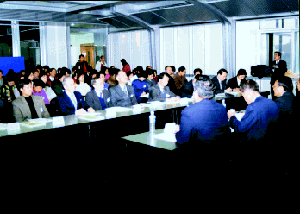
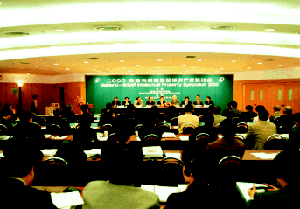
The left picture: Scene of Sino-Japan Symposium on Management of Intellectual Property in Enterprises.
The right picture: Scene of Mainland and Honq Kong SAR Intellectual Property Symposium 2000.
Scene of Symposium on Genetic Engineering and Patent Protection
Mr. Yang Huanming, well-know expert on genetic engineering, is delivering an excellent speech.
From November 7 to 10, CIPS and Asian and Pacific Industrial Center under the Japanese Industrial Property Invention Institution (APIC -JIII) jointly held the "Sino-Japan Seminar on Intellectual Property" in Bejing and Shanghai. More than 140 representatives attended the seminar. It addressed the issues of the role of IPR in the development of enterprises and utilization of patent information.
From November 18 to 29, at the invitation of Japanese Intellectual Property Association (JIPA), the 11-member CIPS delegation headed by Wu Boming, Vice Chairman of the executive council, visited Japan for academic communication. They visited JIPA, JPO, APIC, Japanese Patents Attorneys Association, Industrial Property Cooperation Center (IPCC), Futami Patent Office and some Japanese enterprises. Mr. Wu Boming made two presentations on the revision of the Patent Law in China.
2015-08-12 Print
Print
